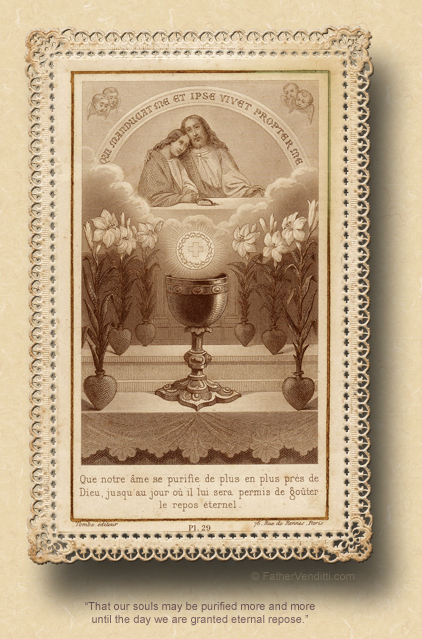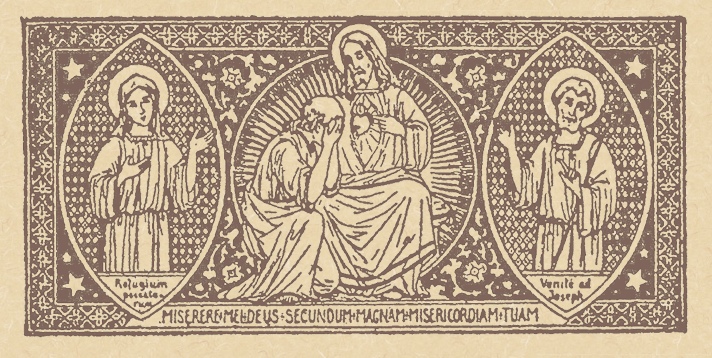Dressing the Windows.
The Third Sunday of Ordinary Time.
Lessons from the secondary dominica, according to the ordinary form of the Roman Rite:
• Jonah 3: 1-5, 10.
• Psalm 25: 4-9.
• I Corinthians 7: 29-31.
• Mark 1: 14-20.
The Third Sunday after Epiphany.
Lessons from the dominica, according to the extraordinary form of the Roman Rite:
• Romans 12: 16-21.
• Psalm 101: 16-17.
• Matthew 8: 1-13.
FatherVenditti.com
|
 8:29 AM 1/21/2018 — The theme of repentance is the thread that links the Scripture lessons of today’s Mass: 8:29 AM 1/21/2018 — The theme of repentance is the thread that links the Scripture lessons of today’s Mass:
The Ninevites, told by the Prophet Jonah that they have forty days to repent or else the Lord will destroy them, only need one day to heed God’s warning before they change their evil ways and are spared. Of course, if you recall any of the other multiple times we’ve reflected together on this particular book of the Bible, you know that’s not nearly the end of the story, as Jonah is none to happy about all this, and for his own bizarre reasons. The lesson today stops short of allowing us to be confused at that, leaving it as a simple declaration that repentance is a beautiful thing.
Likewise, the Blessed Apostle Paul has a lot more to say to the Corinthians that just this simple lesson about how the end of all things will come suddenly and without warning. In the context of the whole of his detailed diatribe about what occasioned his two letters to them, this brief passage about how “time is running out” is given to us by the Missal as a stand-alone about the need for repentance.
Finally, the Blessed Evangelist Mark, as he usually does, gets to the point rather quickly, starting us off with our Blessed Lord’s first recorded words as an adult: “…Jesus came into Galilee, preaching the gospel of God’s kingdom: ‘The appointed time has come,’ he said, ‘and the kingdom of God is near at hand; repent, and believe the gospel’” (Mark 1: 14-15 Knox);* this is followed by our Lord calling the first four of His disciples, who all follow after Him without any hesitation or question.
All of these passages we’ve look at many times before, and all of them, each by itself, has a much larger story to tell than what’s presented to us here. They’re pared down to their bare bones and presented together today to obviously transmit to us a sense of urgency and immediacy. We have to change our lives now, not later.  We have to follow Christ completely, not partially. Or, to put it another way,—using the phrase once again that permeated so much of my preaching to you last year—“our one purpose on earth is to work out our salvation; everything else is just window-dressing.” We have to follow Christ completely, not partially. Or, to put it another way,—using the phrase once again that permeated so much of my preaching to you last year—“our one purpose on earth is to work out our salvation; everything else is just window-dressing.”
How does one follow the Lord? The answer to that question, of course, will not be the same for everyone. How a husband or wife, a father or mother, answers that question is qualitatively different than how a priest or someone in religious life would answer it. Nevertheless, there are aspects to following the Lord that are common to everyone regardless of his or her state in life, and one of them is the undercurrent found between the lines of all the lessons presented to us today: detachment. The soul focused on his or her journey back to the Creator must, by necessity, avoid focus on the things and concerns of this world. Love of self, excessive concern for our health, hand-wringing about the uncertainty of the future, the desire for riches or material goods, enslavement to the pleasures the world has to offer … all these things can, and often do, get in the way.
Of course, simply stating that doesn’t explain how it’s done. If God has placed us temporarily in this world, then we have to live in it and use this time to “work out our salvation,” which means that we have to maintain ourselves in this world for the brief time that we’re here. We have to provide for ourselves and for our families so that we are able to do what needs to be done to prepare for our final judgment. So, when I say to you that “everything else is just window-dressing,” that doesn’t absolve us from the fact that the windows do have to be dressed nonetheless. The key to doing that properly is detachment. We use the things of this world and this present life for a purpose, and that purpose is far beyond the confines of the temporary world in which we now live.  Saint Paul, in today’s third lesson—if you count the psalm as a lesson, as is my custom to do—uses a wonderful turn of phrase in his litany of how we should be detached. He speaks of those who “use the world”: …qui utuntur hoc mundo, tamquam non utantur. “…those who take advantage of what the world offers must not take full advantage of it…” (I Cor. 7: 31 Knox). Saint Paul, in today’s third lesson—if you count the psalm as a lesson, as is my custom to do—uses a wonderful turn of phrase in his litany of how we should be detached. He speaks of those who “use the world”: …qui utuntur hoc mundo, tamquam non utantur. “…those who take advantage of what the world offers must not take full advantage of it…” (I Cor. 7: 31 Knox).
In my own book about Arthur Conan Doyle and his writing of the Sherlock Holmes mysteries—which is available at barnesandnoble.com, by the way; just search for my name—I mention that not all of the stories are all that good, but the best ones are the ones in which Doyle used Holmes, not the other way ‘round. That’s how we must approach our own use of the created world God has provided for us: we use the world, we don’t let it use us, and we certainly don’t let it use us up. “You cannot serve both God and mammon,” our Lord said (cf. Mark 10: 21). And, if you remember, how did we translate that Aramaic word “mammon”? It doesn’t simply mean “money”; it means money with an elevated status, money regarded as a “person,” money which is not possessed by us, but actually possesses us because we have made the pursuit of it a goal in and of itself. But, in context, it doesn’t mean just money, but anything and everything that continually draws our focus of attention to this world and it’s concerns, pushing our desire for heaven to the back burner. There’s a wonderful passage in Lumen gentium, the most important decree of the Second Vatican Council:
Hence, let them all see to it that they guide their affections rightly; otherwise, they will be thwarted in the search for perfect charity by the way they use earthly possessions, and by a fondness for riches which goes against the gospel spirit of poverty. The Apostle has sounded the warning: “let those who make use of this world not get bogged down in it, for the structure of this world is passing away” (LG 42).
Let us rededicate ourselves to heeding the Apostle’s warning. Let us pray frequently the words of today’s Psalm: “Your ways, O Lord, make known to me; teach me Your paths. Guide me in Your truth and teach me, for You are God my Savior” (Psalm 25: 4-5 RM3, emphasis added).

* Consistent with the custom of his day, Msgr. Knox does not employ quotation marks in his translation. I often add them for the sake of clarity.
|

